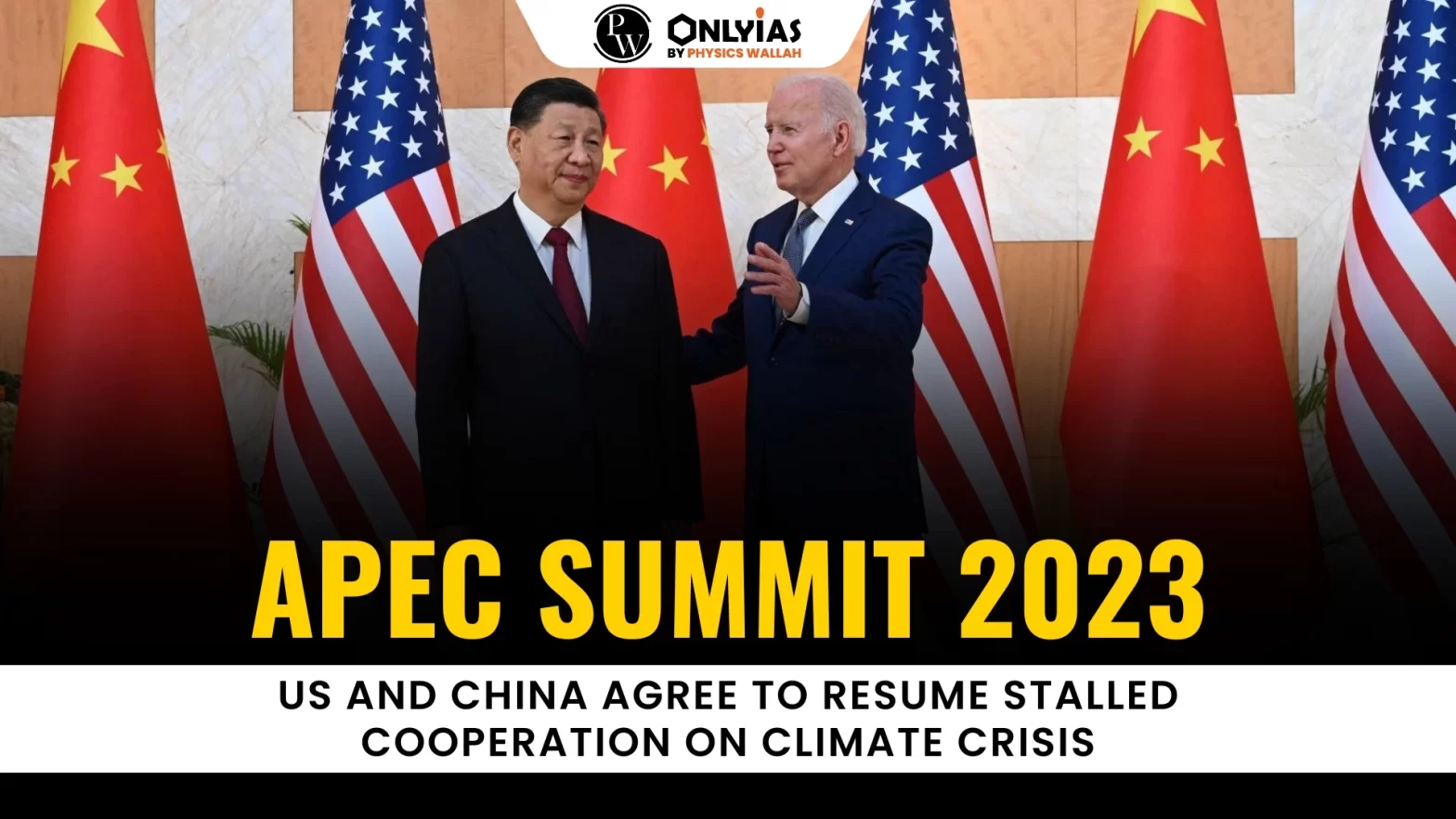Context:
- This article is based on an Editorial “The US-China Truce: Where India Needs To Assess The Changes In Great Power Relations” which was published in the Indian Express. Recently, the bilateral summit between the US President and the Chinese leader was held in San Francisco on the margins of the Asia-Pacific Economic Cooperation (APEC).
- APEC is a multilateral economic and trade forum that was established in 1989 to promote free trade and economic cooperation in the Asia-Pacific region.
| Relevancy for Prelims: APEC Summit 2023, South China Sea, and AUKUS.
Relevancy for Mains: International Relations and Impact on India. |
APEC Summit 2023 – Focus on Climate Change in the Meeting
- Climate Deal: The US and China have reached a new climate deal that could provide a boost to the upcoming global climate talks in Dubai.
- Target: The deal aims to triple renewable energy capacity globally by 2030 and accelerate the substitution of coal, oil, and gas.
- Reduction of Methane Emissions: Both countries also agreed to set reduction targets for methane emissions in their next set of national climate pledges.
- Positive Attitude: It represents a significant step forward in cooperation between the world’s two largest polluters.
Rising Concerns
- The deal is short on enforcement mechanisms.
- Some critics argue that the deal does not go far enough to address climate change.
Stalemate Persists in Regional Security Dialogue Amidst Taiwan Tensions
- There was no sign of any major breakthrough in this regional security dialogue, especially on Taiwan which China sees as the “most sensitive issue” in bilateral relations.
- Xi Jinping wants the US to stop supporting “Taiwan’s independence”, while Washington wants Beijing to renounce the use of force to unite Taiwan with the People’s Republic.
What factors have contributed to the decline in bilateral relations between the US and China?
- Trade war and Tariffs: The Trump administration launched a trade war in 2018, placing tariffs on Chinese goods worth billions of dollars and China retaliated with counter-tariffs, impacting the economic ties.
- Technology Competition: The US has taken steps to limit Chinese access to sensitive technologies like semiconductors and Artificial Intelligence, citing security concerns, and even blocking Huawei.
- South China Sea Disputes: China’s expansive territorial claims and militarization in the South China Sea have heightened tensions with the US and its allies. The US Navy regularly conducts “freedom of navigation” operations there.
- Taiwan Tensions: China’s military pressure and threats toward Taiwan have grown. The US continues to sell weapons to Taiwan and advocates for its participation in international organizations, angering China.
- Human Rights Issues: The repression of Uyghur Muslims in Xinjiang, crackdown on dissent in Hong Kong, and other human rights issues have emerged as major irritants.
- Espionage Accusations: The US has indicted several Chinese hackers and intelligence officials in recent years for alleged cyberattacks and economic espionage, causing diplomatic strains.
- Ideological Rivalry: The US sees China as a challenger to Western democratic values and global leadership. China promotes its authoritarian governance model as superior.
- Groupings: The US has elevated the Quadrilateral forum with Australia, India, and Japan to the summit level, and created a new forum called AUKUS with Australia and the United Kingdom, which is seen by China as an anti-China coalition.
The Path Ahead for India
- Continuous Assessment: India needs to continuously assess the changes in power relations among the US, China, and Russia and should take advantage of the new possibilities to strengthen its ties with the US, maintain its long-standing ties with Russia, and manage the difficult ties with China.
- Strengthen More: India’s own rise in the international system allows it to effectively handle any sudden shifts in International Relations. Hence, it is desirable to further strengthen and rise in the international system.
Conclusion:
APEC Summit 2023 witnessed a positive turn in US-China climate cooperation, but persistent challenges in regional security dialogues highlight the complex nature of bilateral relations, prompting India to strategically navigate changing global dynamics.
News Source: The Indian Express
| Prelims Question (2016)
Consider the following statements:
1. New Development Bank has been set up by APEC.
2. The headquarters of New Development Bank is in Shanghai.
Which of the statements given above is/are correct?
(a) 1 only
(b) 2 only
(c) Both 1 and 2
(d) Neither 1 nor 2
Ans: (b) |
![]() 17 Nov 2023
17 Nov 2023

